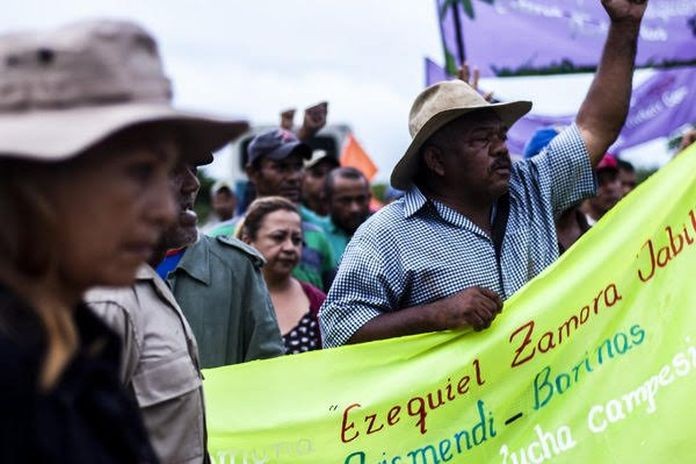By Andreína Chávez Alava
CARACAS, (venezuelanalysis.com) – Venezuelan campesino leader Carlos Bolívar was killed on Thursday by alleged hitmen in Guárico state, prompting outrage from popular and rural organizations across the country.
“With great pain and indignation, we inform that comrade Carlos Bolívar was murdered this morning by hired assassins while he worked in Puerto Carrizalero-Camaguán, Guárico,” announced the Campesino Struggle Platform in a communique.
Bolívar is remembered as the leading figure in the rescue of Los Tramojos landstead, located in the Camaguán municipality, which became a symbol of rural communities’ struggle against wrongful dispossession by private landowners.
Los Tramojos territory had been unproductive for years until a group of campesino families, organized as the Ezequiel Zamora Collective, earned the right to access and work the land in 2011 under Hugo Chávez’s 2001 Land Law. The legislation was created to address land ownership inequality. For seven years, the plot was revived, contributing to the country’s food production.
However, in 2017 the 40 families were violently evicted and their houses and crops destroyed by local businessman José Elías Chirimelli, who claimed to own Los Tramojos with backing from local judicial authorities. The displaced community began a legal battle to recover the land, which included the 2018 Admirable Campesino March to demand justice in the countryside, organized and led by Bolívar alongside other rural leaders.
Although president Nicolás Maduro ordered Los Tramojos’ returned to the campesinos, the case remained stagnated. In 2019, the families tried to enter the land but were met with repression and later staged several protests in Caracas. In December 2021, Venezuela’s Supreme Court (TSJ) finally ruled in favor of the campesino organization in the case against private landowner Chirimelli.
In February 2022, 35 families comprising around 250 people received the land titles and reactivated food production in the estate, but were under constant persecution. According to the Ezequiel Zamora Collective spokesman Ramón Soto, Bolívar had received public death threats since 2018 from Chirimelli’s men. He added that the campesino leader was murdered around noon and received six gunshots.
In an interview with Venezuelanalysis right after recovering Los Tramojos, Bolívar had warned that Chirimelli’s attacks against the rural families were not going to cease.
The Campesino Struggle Platform, where Bolívar was a main spokesperson, has demanded the Venezuelan government investigate the assassination and deliver justice as soon as possible.
“A year after the campesino [families] won the legal struggle in Los Tramojos case and were successfully working the land, this crime occurs, taking away one of the best cadres from this revolutionary process. We want justice for our brother Carlos Bolívar,” stated the platform.
Next week popular and rural organizations are expected to march to the National Assembly (AN) and the Attorney General’s Office in Caracas to demand the opening of a procedure.
For his part, Guárico governor José Manuel Vásquez lamented the loss and promised there would be justice, stating that Bolívar had been the victim of “unscrupulous people” and that authorities “will look under the stones if necessary.”
Commune minister Jorge Arreaza likewise expressed “deep sorrow” and honored Bolívar as “a comrade of just struggles” who was “forged in Revolution and protected the most humble, the landless and the good.”
Additionally, National Land Institute (INTI) President David Hernández condemned the veteran campesino leader’s assassination and called for justice. “I raise my voice and join popular movements in their mourning,” he said recalling that Bolívar was recently elected as spokesman of the so-called National Land Commission.
“Carlos is and will continue to be a reference of struggle,” stated Hernández.
National deputy and spokesperson of the anti-eviction Tenants’ Movement Rigel Sergent as well as other grassroots leaders and rural organizations also deplored Bolívar’s murder by the alleged hired hitmen.
Venezuelan campesino movements have repeatedly denounced a “landowner offensive” in the countryside in the last 22 years, including judicialization cases and over 350 targeted killings ordered by powerful landowners in an attempt to dispossess families.





